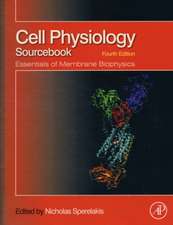Bioprobes: Biochemical Tools for Investigating Cell Function
Editat de H. Osadaen Limba Engleză Hardback – 30 apr 2000
Preț: 505.11 lei
Preț vechi: 631.39 lei
-20% Nou
Puncte Express: 758
Preț estimativ în valută:
96.66€ • 104.96$ • 81.20£
96.66€ • 104.96$ • 81.20£
Carte tipărită la comandă
Livrare economică 18-24 aprilie
Preluare comenzi: 021 569.72.76
Specificații
ISBN-13: 9784431702474
ISBN-10: 4431702474
Pagini: 328
Ilustrații: 1
Dimensiuni: 156 x 234 x 23 mm
Greutate: 0.64 kg
Ediția:2000
Editura: Springer
Colecția Springer
Locul publicării:Tokyo, Japan
ISBN-10: 4431702474
Pagini: 328
Ilustrații: 1
Dimensiuni: 156 x 234 x 23 mm
Greutate: 0.64 kg
Ediția:2000
Editura: Springer
Colecția Springer
Locul publicării:Tokyo, Japan
Public țintă
ResearchDescriere
Rapid advances in the study of the molecular basis of mammalian cell proliferation, differentiation, and apoptosis have made it possible to develop new screening systems for isolating from microbial metabolites specific inhibitors of mammalian cell functions. "Bioprobes" is the term used to describe these inhibitors, which are extremely useful agents in investigating the molecular and chemical regulation of eukaryotic cell function and apoptosis. Another area where bioprobes are playing an important role is research into immune cell function. This book is the first to present the groundbreaking applications of bioprobes as tools for biochemical research. A large appendix contains the chemical structure, origin, function, key references, and other essential data for more than 80 important bioprobes. The information for each bioprobe is shown in a two-page display, in an easy-to-use format for identifying specific bioprobes for investigation of cell function.
Cuprins
1 Trends in Bioprobe Research.- 1 Introduction.- 2 Sources of Bioprobes.- 3 Development of Bioprobes.- 4 Targets for Bioprobes.- 5 Trends and Prospects.- References.- 2 Cell Proliferation: From Signal Transduction to Cell Cycle.- 1 Introduction.- 2 Membrane/Cytoplasmic Signal Transduction.- 3 Nuclear Signal Transduction.- 4 Cell Cycle Control.- 5 Future Prospects.- References.- 3 Differentiation.- 1 Introduction.- 2 Differentiation of Hematopoietic Cells.- 3 Differentiation of Neuron Cells.- 4 Differentiation of Skeletal Cells (Bone and Muscle Cells).- 5 Differentiation of Liver: Hepatocytes.- 6 Epidermal Differentiation.- References.- 4 Apoptosis.- 1 Introduction.- 2 Tyrosine Kinase.- 3 Ceramide Synthesis.- 4 Fas Signaling.- 5 c-Jun NH2-Terminal Kinase.- 6 Cyclooxygenase-2.- 7 Calmodulin-Dependent Kinase III.- 8 PI-3 Kinase-Akt.- 9 Cell Cycle Regulator.- 10 p53.- 11 Hydroxymethyl Glutaryl CoA Reductase.- References.- 5 Immune Cell Functions.- 1 Introduction: Immune Network.- 2 Bioprobes for Lymphocyte Proliferation.- 3 Signal Transduction and Gene Expression in the Process of T Cell Activation.- 4 Cell-Mediated Cytotoxicity and Its Bioprobes.- 5 Conclusions.- References.- 6 Bioprobes at a Glance.- Authors and Collaborators.
Caracteristici
Written by active scientists in the field, this book provides useful information on all important bioprobes










